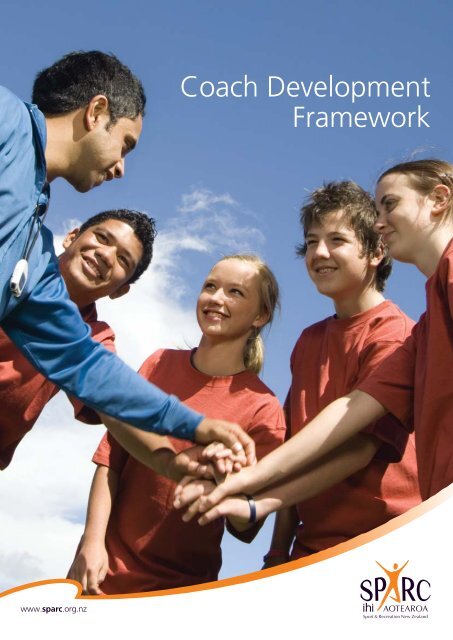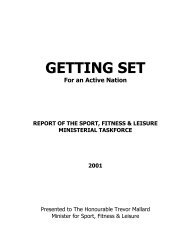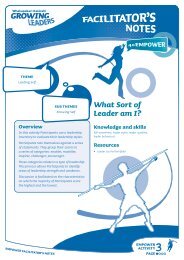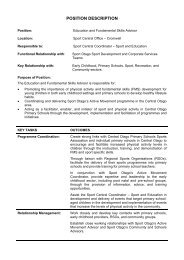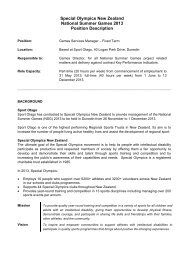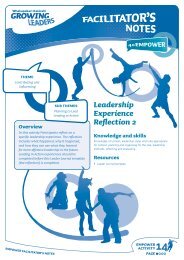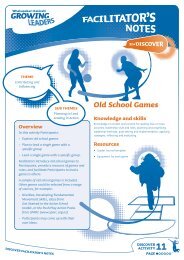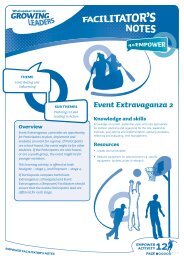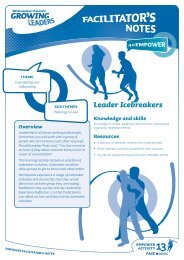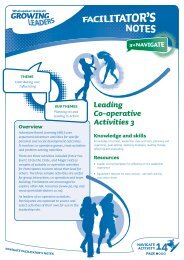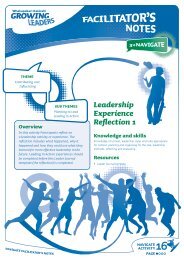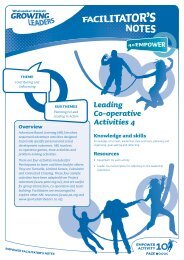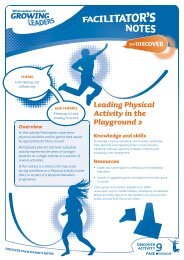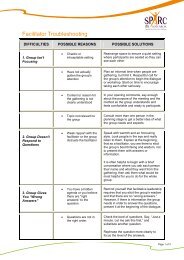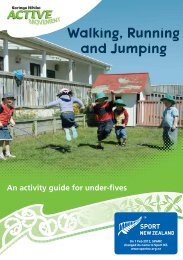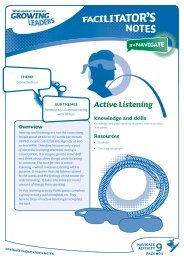Coach Development Framework - Sport New Zealand
Coach Development Framework - Sport New Zealand
Coach Development Framework - Sport New Zealand
Create successful ePaper yourself
Turn your PDF publications into a flip-book with our unique Google optimized e-Paper software.
i<br />
<strong>Coach</strong> <strong>Development</strong><br />
<strong>Framework</strong><br />
www.sparc.org.nz
Acknowledgements<br />
The <strong>Coach</strong> <strong>Development</strong> <strong>Framework</strong> has been developed to initiate the implementation<br />
of the coach education tactic of the <strong>New</strong> <strong>Zealand</strong> <strong>Coach</strong>ing Strategy.<br />
To implement this tactic, <strong>Sport</strong> and Recreation <strong>New</strong> <strong>Zealand</strong> (SPARC) has convened a<br />
<strong>Coach</strong> <strong>Development</strong> Working Party that has met five times to establish the philosophy<br />
and directions for coach development in <strong>New</strong> <strong>Zealand</strong>.<br />
SPARC acknowledges the contribution of: Alec Astle (Cricket), Gill Gemming (Hockey),<br />
Ken Hodge (University of Otago), Lyn Johnston (<strong>New</strong> <strong>Zealand</strong> Academy of <strong>Sport</strong>), Lynn<br />
Kidman (Christchurch College of Education), Sue Emerson (Unitec), Mark McLaughlin<br />
(<strong>Sport</strong> Waikato), Andy Roche (Halberg Trust), Paul Smalley (<strong>Sport</strong> Consultant), Nicky<br />
Sherriff, John Reid and Paul Ackerley (SPARC) in producing this document.<br />
SPARC also wishes to thank Alex Scott and Rob Wilkinson, previously of the <strong>Sport</strong>,<br />
Fitness and Recreation Industry Training Organisation (SFRITO), who have attended<br />
sessions of the Working Party meetings, and other key players in coaching who have<br />
provided feedback on the draft <strong>Framework</strong> document.
COACH DEVELOPMENT FRAMEWORK 1<br />
Table of<br />
Contents<br />
<strong>Coach</strong> <strong>Development</strong> <strong>Framework</strong><br />
Introduction 3<br />
<strong>Coach</strong> <strong>Development</strong> Vision 3<br />
Philosophy 3<br />
Principles 3<br />
Overview 4<br />
Structure 5<br />
Programme <strong>Development</strong> 9<br />
Training <strong>Coach</strong> Trainers, Mentors and Assessors 9<br />
Delivery 9<br />
Assessment 11<br />
Accreditation 12<br />
Inclusiveness 12<br />
Implementation Plan 12<br />
Roles of Key Players 12<br />
Appendix 1 – Athlete Characteristics and Needs 16<br />
Appendix 2 – <strong>Coach</strong> <strong>Development</strong> Programme Components 22
COACH DEVELOPMENT FRAMEWORK 3<br />
<strong>Coach</strong> <strong>Development</strong><br />
<strong>Framework</strong><br />
Introduction<br />
The <strong>Coach</strong> <strong>Development</strong> <strong>Framework</strong> derives from the <strong>New</strong> <strong>Zealand</strong> <strong>Coach</strong>ing Strategy<br />
and outlines the structures, policies and procedures to implement tactic three of this<br />
Strategy – ‘Improve coach education requirements and qualifications’.<br />
The <strong>Framework</strong> provides a vision, establishes consistent national parameters and aligns<br />
the roles of the key players for coach development in <strong>New</strong> <strong>Zealand</strong>.<br />
<strong>Coach</strong> <strong>Development</strong> Vision<br />
The vision of the <strong>New</strong> <strong>Zealand</strong> <strong>Coach</strong>ing Strategy is to create a ‘World-Class <strong>Coach</strong>ing<br />
Environment’.<br />
To support this, the vision for coach development is to achieve:<br />
‘excellence in coaching practice’<br />
through:<br />
‘a national coach development system that empowers coaches to provide a high<br />
quality coaching service to all athletes’.<br />
Philosophy<br />
<strong>Coach</strong> development is based on continuous improvement through the increasingly<br />
effective integration of coaching skills, knowledge and understandings in<br />
coaching practice.<br />
Principles<br />
The principles for coach development reflect those of the <strong>New</strong> <strong>Zealand</strong><br />
<strong>Coach</strong>ing Strategy.<br />
• Ownership – coach development will be owned by coaches and those<br />
responsible for supporting coaches. National <strong>Sport</strong> Organisations (NSOs) will<br />
be primarily responsible for coach development within their sport.<br />
• Simplicity – coach development systems and procedures will be easy to<br />
understand, administer and maintain.<br />
• Holistic – coach development programmes will equip coaches to support the<br />
holistic development of their athletes to produce self-reliant athletes.<br />
• Outcome focused – coach development activities will support the objectives of<br />
the <strong>New</strong> <strong>Zealand</strong> <strong>Coach</strong>ing Strategy – more time, increased recognition and<br />
status, and improved quality.<br />
• Continuous improvement – the <strong>Coach</strong> <strong>Development</strong> <strong>Framework</strong> will enable and<br />
encourage coaches to participate in ongoing development opportunities.<br />
• Partnership – coach development approaches will utilise the combined<br />
knowledge and experience of all the key players in coaching.
4<br />
In addition coach development will be:<br />
•<br />
Community based – aligned with the <strong>New</strong> <strong>Zealand</strong> <strong>Coach</strong>ing Strategy<br />
coaching communities.<br />
Athlete centred – based on the needs of the athletes in the coaching<br />
communities and aligned to the stage of development of the athletes.<br />
Applicable and practical – to meet the needs of the coaches that are developed,<br />
so they can apply key learnings immediately.<br />
Integrated – the sport-specific and general principles of coaching will be applied<br />
in a practical coaching environment.<br />
Flexible – to meet the range of needs of athletes, coaches and sports.<br />
Inclusive – to acknowledge the needs of all athletes, including those<br />
with disabilities.<br />
Appropriate for <strong>New</strong> <strong>Zealand</strong> – reflective of <strong>New</strong> <strong>Zealand</strong>’s unique cultural<br />
and sporting environment.<br />
•<br />
•<br />
•<br />
•<br />
•<br />
•<br />
Overview<br />
The <strong>New</strong> <strong>Zealand</strong> <strong>Coach</strong>ing Strategy defines coaching communities based on the<br />
indicative age of the groups of athletes coached. The SPARC Talent <strong>Development</strong><br />
project is based on the stage of development of the athletes.<br />
The <strong>Coach</strong> <strong>Development</strong> <strong>Framework</strong> builds on and aligns these two documents, builds<br />
on the work of the SPARC Junior <strong>Sport</strong> reference group and will be compatible with a<br />
similar framework document for sport officials.<br />
Figure 1 (derived from the SPARC Talent <strong>Development</strong> <strong>Framework</strong> document) represents<br />
an athlete development model that acknowledges the coaching communities, the<br />
stages of athlete talent development and key athlete support networks.<br />
This multi-faceted athlete development model provides a mechanism for dealing with<br />
the vast array of different circumstances in which athletes (and hence coaches) in<br />
different sports find themselves. Both athlete and coach development programmes<br />
need to coherently link these factors.<br />
Figure 1: Athlete <strong>Development</strong> Model<br />
•<br />
•<br />
•<br />
•<br />
•<br />
•<br />
•<br />
Family/Home<br />
Community Groups<br />
<strong>Sport</strong> Organisations<br />
Education Providers<br />
Private Providers<br />
Iwi<br />
<strong>Sport</strong> Medicine/<br />
Science<br />
Facilities<br />
•<br />
Athlete<br />
Support<br />
Networks<br />
ATHLETE<br />
NEEDS<br />
<strong>Coach</strong>ing<br />
Community<br />
•<br />
•<br />
•<br />
•<br />
•<br />
•<br />
•<br />
•<br />
Early Childhood<br />
Middle Childhood<br />
Late Childhood<br />
Early Teenage<br />
Late Teenage<br />
Social Adult<br />
Competitive Adult<br />
High Performance<br />
Stage of Talent<br />
<strong>Development</strong><br />
•<br />
•<br />
•<br />
•<br />
•<br />
Explore<br />
Learn<br />
Participate<br />
Perform<br />
Excel
COACH DEVELOPMENT FRAMEWORK 5<br />
Structure<br />
The <strong>Coach</strong> <strong>Development</strong> <strong>Framework</strong> provides the structure for the delivery of<br />
coach development within <strong>New</strong> <strong>Zealand</strong>. It represents a range of applied learning<br />
opportunities that will be available for coaches within each community and identifies<br />
the key concepts that underpin this structure.<br />
The aim of the <strong>Framework</strong> is to provide sufficient information to enable NSOs to create<br />
coach development programmes and accreditation systems, but at the same time be<br />
sufficiently flexible to meet the varying needs of different sports.<br />
<strong>Coach</strong> development will be athlete centred. <strong>Coach</strong> development requirements will<br />
be based on athlete needs. <strong>Coach</strong> development will equip the coach to apply, in a<br />
practical context, requisite knowledge, skills and understanding to meet the collective<br />
and individual needs of athletes in the coaching communities in which they coach. This<br />
includes athletes with disabilities and athletes from all ethnic backgrounds and cultures.<br />
Other key players in coaching will provide necessary support services.<br />
Figure 2: Athlete-centred <strong>Coach</strong> <strong>Development</strong><br />
<strong>Coach</strong>es<br />
<strong>Coach</strong><br />
Educators<br />
<strong>Coach</strong>ing meets<br />
athlete needs<br />
Programmes meet<br />
athlete needs<br />
ATHLETES<br />
<strong>Coach</strong> Support Networks<br />
Including SPARC, NZAS, NSOs, RSOs, RSTs, clubs,<br />
schools, tertiary providers, parents, sport science and<br />
medicine providers, SFRITO, community groups
6<br />
Within each coaching community, while undertaking their coaching practice, coaches<br />
will have access to a range of both formal and informal coach development learning<br />
opportunities. In this document, learning opportunities for formal coach development<br />
programmes are grouped under general and sport-specific principles and are broken<br />
down into knowledge and skills packages (modules). This enables flexible delivery<br />
and the potential to progressively accumulate learning, according to the needs and<br />
priorities of individual athletes, coaches and sports.<br />
Relevant learning will be integrated into ongoing coaching practice as illustrated<br />
in Figure 3.<br />
Figure 3: Continuous Learning Model<br />
Learning Modules – Learning Integrated into <strong>Coach</strong>ing Practice<br />
Ongoing coaching practice<br />
The modules will cater for a range of experience of coaches and stages of athlete<br />
development within specific coaching communities.<br />
In addition, coaches will have access to informal coach development opportunities<br />
that will support wider personal development and growth. Examples of informal<br />
coach development include trial and error learning in conducting coaching<br />
practice, attendance at seminars and conferences, mentoring, informal networking<br />
opportunities with coaches from their own and other sports, and access to individual<br />
research opportunities (through both written and electronic media).<br />
The coach development knowledge and skills modules that might be available in, for<br />
example, the Late Teenage coaching community to cater for the development needs<br />
of coaches with different levels of effectiveness and experience are represented in<br />
Figure 4. The table in Appendix 2 provides guidelines for the potential content of<br />
these modules.<br />
Figure 4: <strong>Coach</strong>ing Community Learning Opportunities<br />
Knowledge and Skills Modules – Represented by Dark Boxes<br />
Late Teenage<br />
community<br />
(17–19)<br />
Beginning coach<br />
Increasing<br />
effectiveness<br />
Mentor, coach trainer,<br />
specialist skills
COACH DEVELOPMENT FRAMEWORK 7<br />
If Figure 4 is extended to include all the coaching communities, and to acknowledge<br />
the importance of informal coach development, the result is a smorgasbord of learning<br />
opportunities for coaches, based on coaching practice, as represented in Figure 5.<br />
The ages quoted are indicative only.<br />
Figure 5: <strong>Coach</strong> <strong>Development</strong> <strong>Framework</strong> I<br />
High Performance<br />
community<br />
Formal Learning<br />
Informal<br />
Learning<br />
Competitive<br />
Adult<br />
Social Adult<br />
Late Teenage<br />
(17–19)<br />
Early Teenage<br />
(13–16)<br />
Late Childhood<br />
(9–12)<br />
Middle Childhood<br />
(6–8)<br />
Seminars<br />
Conferences<br />
Self-learning<br />
Mentoring<br />
Interactions with<br />
other coaches<br />
‘On job’ learning,<br />
etc<br />
Early Childhood<br />
(0–5)<br />
Beginning<br />
coach<br />
Increasing<br />
effectiveness<br />
Mentor,<br />
coach trainer,<br />
specialist skills
8<br />
NSOs can group modules to form programmes and related qualifications that meet the<br />
needs of their sport. They may wish, for example, to create one coach development<br />
programme to target the Middle and Late Childhood communities and the stages of<br />
development of primary school aged athletes (6–12 years). Alternatively, they may<br />
wish to create a coach development programme in the Early Teenage community<br />
that provides learning for less experienced coaches, but also cater for the skills and<br />
knowledge of their most experienced coaches by providing an additional programme<br />
encompassing a number of extension modules.<br />
In addition, Figures 4 and 5 include modules for mentors, coach trainers and specialist<br />
skill coaches (e.g. a soccer goalkeeping coach), as required by the sport.<br />
The detail to be included in the different modules will be guided by the information in<br />
Figure 6. The columns of Figure 6 split components of coach development into sportspecific<br />
and general principle categories. The general principles column is further split<br />
to recognise coach development programme components directly related to ‘Athlete<br />
<strong>Development</strong>’ and other general components of coach development that arise from<br />
this. In Appendix 1, the detail within the ‘Athlete <strong>Development</strong>’ column is extended to<br />
list key points of difference between the developmental characteristics of the athletes<br />
and the corresponding athlete needs in the different communities.<br />
Possible components of the ‘General Principles’ and ‘<strong>Sport</strong>-specific Principles’ columns<br />
of Figure 6 are listed in Appendix 2. This information is intended as a guide to NSOs for<br />
programme development and for the development of general principles modules and<br />
resources to be coordinated by SPARC. Use of the information in the two appendices<br />
will help ensure a systematic coaching progression for athletes as they move through<br />
the coaching communities.<br />
Figure 6: <strong>Coach</strong> <strong>Development</strong> <strong>Framework</strong> II<br />
<strong>Coach</strong>ing Community<br />
High Performance<br />
Competitive Adult<br />
Social Adult<br />
Late Teenage (17–19)<br />
Early Teenage (13–16)<br />
Late Childhood (9–12)<br />
Middle Childhood (6–8)<br />
Early Childhood (0–5)<br />
General Principles<br />
(Applied in Practice)<br />
Athlete<br />
<strong>Development</strong><br />
Based on<br />
characteristics<br />
of the athletes<br />
in each<br />
community, the<br />
related athlete<br />
needs and how<br />
athletes learn<br />
Other General<br />
Principles<br />
Based on coach<br />
leadership,<br />
the coaching<br />
process,<br />
coach self<br />
development,<br />
(including some<br />
sport science),<br />
and programme<br />
management<br />
<strong>Sport</strong>-specific<br />
Principles<br />
(Applied in Practice)<br />
Will include sportspecific<br />
components<br />
addressing technical<br />
and tactical aspects of<br />
sports, sport science<br />
specific to individual<br />
sports and other sportspecific<br />
requirements
COACH DEVELOPMENT FRAMEWORK 9<br />
Programme <strong>Development</strong><br />
NSOs will create coach development programmes based on this <strong>Framework</strong> and the<br />
details in Appendices 1 and 2. SPARC will provide guidelines and work with NSOs<br />
to produce:<br />
1. Key policies and procedures to:<br />
•<br />
•<br />
•<br />
•<br />
•<br />
write coach development programmes<br />
administer programmes<br />
consistently deliver programmes<br />
evaluate and review programmes<br />
assess learning.<br />
2. <strong>Coach</strong> development programme documentation that includes:<br />
•<br />
•<br />
•<br />
•<br />
•<br />
•<br />
•<br />
•<br />
competency statements<br />
programme-specific administration detail (target audience, duration, etc)<br />
module structure/learning outcomes/content<br />
delivery processes (including coaching practice requirements)<br />
quality assurance of delivery<br />
assessment processes<br />
resources requirements<br />
accreditation/reaccreditation requirements.<br />
Training <strong>Coach</strong> Trainers, Mentors and Assessors<br />
This is a major priority for the coach development process and it must be addressed<br />
if the standards of coach development are to improve. <strong>Coach</strong> trainers, mentors and<br />
assessors need to be well trained. SPARC will have a significant role in initiating high<br />
quality training systems that allow NSOs, and other deliverers of coach development,<br />
to train their coach trainers, mentors and assessors utilising the skills and knowledge<br />
of appropriate key players in coaching.<br />
SPARC will develop policies, procedures and programmes for this training. SPARC<br />
will also maintain a relationship with SFRITO that recognises the potential for sports<br />
to enter into a training agreement with SFRITO and link to SFRITO practical assessor<br />
training programmes, if they wish.<br />
Delivery<br />
<strong>Coach</strong> development will be delivered through the NSO/Regional <strong>Sport</strong> Organisation<br />
(RSO) networks or by providers approved by the NSO or RSO. Approved providers<br />
could include Regional <strong>Sport</strong>s Trusts (RSTs), tertiary education providers and the<br />
Academy of <strong>Sport</strong> network.<br />
Learning will include integration of sport-specific knowledge along with general<br />
principles, as much as possible through coaching practice. If this is not feasible, part<br />
of the learning process will be to support trainee coaches to integrate the theoretical<br />
learning within their coaching practice. Similarly, in undertaking practical coaching the<br />
coach will identify further areas for ongoing development and/or informal learning.<br />
Figure 7 on the following page represents this interaction.
10<br />
Figure 7: <strong>Coach</strong> <strong>Development</strong> Delivery Model<br />
<strong>Sport</strong>specific<br />
knowledge<br />
and skills<br />
<strong>Coach</strong>ing<br />
practice<br />
General<br />
principles<br />
Informal learning<br />
The actual delivery of coach development needs to be flexible and varied to meet<br />
the needs of different coaches. For beginning coaches with little previous coaching<br />
experience, the initial coach development may be as simple as an induction by an<br />
NSO-approved trainer:<br />
•<br />
•<br />
•<br />
•<br />
providing key resources (including a Code of Ethics)<br />
providing guidance on how to use the resources<br />
helping coaches to set a positive coaching environment (including safety)<br />
demonstrating some simple skills and delivery methods, including modelling<br />
of general coaching principles<br />
providing access to more experienced local people, within the sport,<br />
for further help.<br />
•<br />
The key is to give the beginning coach confidence, some basic coaching methods<br />
and information on where they can get further help or opportunity to develop<br />
their coaching.<br />
Delivery of ongoing coach development can then be based on more structured<br />
learning programmes, facilitated through trained and qualified coach trainers,<br />
presenters or mentors. Ideally much of this coach development should be delivered<br />
in a practical context using techniques such as:<br />
•<br />
•<br />
•<br />
•<br />
demonstrations (integrating sport-specific and general principles)<br />
actual case studies<br />
mentors or ‘buddy’ coaches<br />
discussions based on the coach’s reflection on their coaching practice.<br />
It is acknowledged that an approach which relies on experienced coaches supporting<br />
developing coaches is time intensive. As much as possible, other approaches will be<br />
related to applied practice and may include:<br />
•<br />
•<br />
•<br />
•<br />
workshops<br />
a series of seminars<br />
online or distance education learning opportunities<br />
informal learning opportunities such as attendance at conferences, networking<br />
within and outside the sport etc.
COACH DEVELOPMENT FRAMEWORK 11<br />
Assessment<br />
Assessment is a check that learning has taken place. Assessment will be competency<br />
based. The key to the assessment approach used is that it is fair, valid, appropriate and<br />
non-threatening. An example of valid assessment would be that practical coaching<br />
should be assessed through observing practice rather than writing about how the<br />
practice might be carried out.<br />
Completing written assessments following the delivery of a coach development<br />
module, workshop or programme can prove to be a significant barrier to coaches<br />
completing accreditation requirements. Hence, the rigour of assessment should be<br />
based on coaches’ needs. For example, a coach who wants simply to improve their<br />
own understanding to coach young athletes could be assessed in a different way from<br />
a coach who wants formal recognition of accreditation to advance employment or<br />
appointment prospects, or the coach who wants their learning recognised through<br />
credits on the National Qualifications <strong>Framework</strong>.<br />
In some situations, having no formal assessment may be appropriate. For example,<br />
assessment relating to a briefing or seminar for beginning coaches of athletes in<br />
the Middle Childhood coaching community could be as simple as orally checking<br />
understanding as part of the learning process and providing informal feedback on<br />
coaching practice. Any certificate awarded would be for satisfactory attendance/<br />
completion.<br />
In situations that require more formal assessment, if delivery of coach development is<br />
best carried out using an experiential approach, then it follows that the emphasis of<br />
coach assessment should also be based on the effectiveness of the coach in applying<br />
their learning in a practical context. This can be achieved by approaches such as:<br />
observing application of sport-specific and general principles within his/her<br />
coaching practice (and supplying verbal and/or written feedback)<br />
observing simulations, role plays, videos or demonstrations<br />
assessing the tools that the coach actually uses in his/her practical coaching,<br />
such as planning documents, player analysis data, etc<br />
presentation of a coaching log or coaching practice portfolio<br />
evaluating mentor reports.<br />
•<br />
•<br />
•<br />
•<br />
•<br />
As long as the approach is valid for the knowledge, skills and understandings being<br />
assessed, the following approaches can also be effective:<br />
•<br />
•<br />
•<br />
written or online responses to assessment tasks<br />
oral questioning/interviews<br />
completion of satisfactory reports and oral presentations, etc.<br />
If a sport chooses to work with SFRITO (or NZQA) to align unit standard assessment<br />
to a coach development programme, the key is to define the learning programme first<br />
then work with SFRITO to match appropriate unit standards to the programme.
12<br />
Accreditation<br />
SPARC recommends an accreditation scheme that:<br />
•<br />
•<br />
is the responsibility of the NSO<br />
encourages reaccreditation – that is, the encouragement of practising coaching<br />
accreditation that is renewable with continued coaching, ongoing professional<br />
development, adherence to a <strong>Coach</strong>ing Code of Ethics and, if applicable,<br />
updating of health and safety requirements<br />
has both the NSO and SPARC logos on the certificates of SPARC-endorsed<br />
programmes<br />
includes the requirement for NSOs to have a recognition of prior learning<br />
policy that recognises previous experience and knowledge of general coaching<br />
principles. (NSOs may, however, want to see general principles applied in a<br />
sport-specific setting.)<br />
•<br />
•<br />
Inclusiveness<br />
A key principle of this <strong>Coach</strong> <strong>Development</strong> <strong>Framework</strong> is that the coach will cater for<br />
the needs of the athlete(s) being coached.<br />
<strong>Coach</strong> development will equip coaches to understand their athletes’ needs, including<br />
how to cater equally for athletes with disabilities. NSOs should include references,<br />
examples and illustrations in coach development programmes and resources that<br />
acknowledge athletes’ ethnic backgrounds and cultures, different ability levels,<br />
and disabilities.<br />
Enough flexibility exists in the <strong>Coach</strong> <strong>Development</strong> <strong>Framework</strong> to allow NSOs to be<br />
able to develop programmes, modules and specific resources to meet the coach<br />
development needs of coaches of athletes with disabilities.<br />
Implementation Plan<br />
SPARC has developed a plan to progressively implement the <strong>Coach</strong> <strong>Development</strong><br />
<strong>Framework</strong> that addresses support for NSO programme development, resource<br />
development, and programme delivery and assessment. Key players in coaching will<br />
be advised of timelines and ongoing progress.<br />
Roles of Key Players<br />
The following defines the roles of the key players identified in the <strong>New</strong> <strong>Zealand</strong><br />
<strong>Coach</strong>ing Strategy, in relation to the coach development tactic of the Strategy.<br />
<strong>Coach</strong>es<br />
1. Ownership of their own coach development.<br />
2. Delivery of a quality coaching service to all athletes.<br />
All <strong>Coach</strong>ing Key Players<br />
1. Recruitment, induction, retention, mentoring and support of coaches.<br />
2. Reward and recognition of coaches.<br />
3. Providing access to professional development and coaching opportunities.<br />
4. Creation of professional career opportunities.
COACH DEVELOPMENT FRAMEWORK 13<br />
SPARC<br />
1. Leadership in coach development.<br />
2. Alignment of coach development key players.<br />
3. Identification of key personnel and provision of professional development<br />
support for training coach trainers, mentors and assessors.<br />
4. Management of coach development working groups.<br />
5. Programme development and implementation guidelines.<br />
6. Programme endorsement and ongoing quality assurance.<br />
7. General principle module development.<br />
8. General principle resource development, (electronically available for NSOs<br />
either to use, or adapt for use, in their programmes.)<br />
9. Managing selected coach accreditation data.<br />
10. Research, innovation and information management.<br />
11. Investment in and support of key players.<br />
National <strong>Sport</strong> Organisations (NSOs)<br />
1. Leadership of coach development in their sport.<br />
2. Production of policies and procedures for systematic development,<br />
consistent delivery and assessment, and quality assurance of programmes<br />
(Quality Management System).<br />
3. Research and innovation in their sport.<br />
4. Creating/updating coach development:<br />
•<br />
•<br />
•<br />
•<br />
pathways<br />
programmes<br />
delivery and assessment materials<br />
resources.<br />
5. Implementation, maintenance and quality assurance of coach development<br />
programmes.<br />
6. Delivery and assessment of relevant coach development programmes.<br />
7. Training people in their sport to deliver coach development programmes.<br />
8. Managing coach accreditation data for their sport.<br />
Regional <strong>Sport</strong> Organisations (RSOs)<br />
1. Delivery and assessment of relevant NSO coach development programmes.<br />
2. Implementation of NSO policies and procedures.<br />
3. Working with other key players at the regional level.
14<br />
Clubs<br />
1. Supporting NSO and RSO programmes.<br />
2. Day-to-day communication with, and support of, coaches.<br />
3. Fostering relationships between schools and sports.<br />
Regional <strong>Sport</strong>s Trusts (RSTs)<br />
1. Facilitating:<br />
• relationships among key players of coaching and establishing coaching networks<br />
within and across coaching communities at a regional level<br />
• delivery of programmes in partnership with NSOs, RSOs and other key players<br />
in coaching.<br />
2. Supporting NSOs to deliver their national programmes.<br />
3. Working with NSOs and RSOs to improve capability for delivering national<br />
programmes.<br />
4. Delivering modules on behalf of sports or groups of sports as required.<br />
<strong>New</strong> <strong>Zealand</strong> Academy of <strong>Sport</strong> (NZAS)<br />
1. Supporting coach development in the High Performance coaching community.<br />
2. Facilitating seminar/module/programme delivery for the High Performance<br />
coaching community.<br />
<strong>Sport</strong>, Fitness and Recreation Industry Training Organisation<br />
(SFRITO) and the <strong>New</strong> <strong>Zealand</strong> Qualifications Authority (NZQA)<br />
The potential exists for sports to link with SFRITO and/or NZQA to match unit standards<br />
to their programmes. If they choose to do this, SFITRO will have a role in:<br />
•<br />
•<br />
training of assessors<br />
quality assurance (moderation) of assessment materials, processes and<br />
assessor judgements.<br />
Tertiary Education Providers<br />
Tertiary education providers offer a range of coach development and support<br />
opportunities for working with other coaching key players.<br />
1. Within their programmes, tertiary institutions have the potential to deliver generic<br />
courses that cover requirements of NSO programmes that will be recognised by the<br />
NSOs and/or RSOs.<br />
2. If students from tertiary institutions integrate their practical coaching requirements<br />
with those of the NSOs/RSOs, students will benefit by achieving both a tertiary<br />
qualification and a sport-specific coaching qualification.<br />
3. Students that work with RSOs will potentially gain credibility within that sport’s<br />
networks, which in turn may generate further coaching opportunities or casual or<br />
vocational employment opportunities.
COACH DEVELOPMENT FRAMEWORK 15<br />
4. <strong>Sport</strong>s that work proactively with tertiary institutions and support students in<br />
gaining practical coaching experience open another coach recruitment pathway.<br />
5. Potential exists to develop training programmes for coach trainers, presenters<br />
and mentors.<br />
Schools<br />
Schools have a large number of young people who are interested in sports and<br />
coaching. Potential exists for:<br />
• schools to link with NSO coach development programmes and RST programmes<br />
to gain skills and knowledge that may encourage them to take initial steps on<br />
a coaching pathway<br />
• students to study coach development units of work that gain credit toward<br />
national qualifications<br />
• Physical Education <strong>New</strong> <strong>Zealand</strong> (PENZ) and teachers to play a role in supporting<br />
and encouraging young people to coach<br />
• schools to foster links with clubs and sports.<br />
<strong>Sport</strong> and Exercise Science <strong>New</strong> <strong>Zealand</strong> and <strong>Sport</strong> Medicine<br />
<strong>New</strong> <strong>Zealand</strong><br />
Support for coach development programmes, based on coaches’ needs.
16<br />
Appendix 1: Athlete Characteristics and Needs<br />
The table below expands detail within the ‘Athlete <strong>Development</strong>’ column in Figure 6. It lists characteristics of the athletes and the related athlete needs for the various<br />
coaching communities. Athlete characteristics have not been included in the adult communities as the majority of athletes have passed the stage of significant growth<br />
changes that impact on their ability to perform and be involved in sport.<br />
Community Athlete Characteristics Athlete Needs<br />
Early<br />
Childhood<br />
community<br />
Information and programmes for this community relate directly to SPARC’s Active<br />
Movement initiative. Active Movement recognises the concept of parents as first coaches.<br />
Further development in this area will be coordinated through the SPARC Active<br />
Movement team.
Community Athlete Characteristics Athlete Needs<br />
Middle<br />
Childhood<br />
community<br />
Physical<br />
1. Are developing and mastering fundamental gross motor skills.<br />
2. Are beginning to develop motor coordination.<br />
3. Have slow, steady musculoskeletal growth.<br />
4. Mainly use large muscles – have better control of large than small muscles.<br />
5. Have high energy levels but tire easily and recover quickly.<br />
6. Girls and boys have similar abilities.<br />
7. Learn best if physically active.<br />
8. Have low anaerobic and aerobic capacity.<br />
Social<br />
1. Are dependent on adults, especially parents for support.<br />
2. Self and family orientated but begin to experience empathy for others and start to<br />
become independent.<br />
3. Are learning how to be friends and may have several ‘best friends’ at a time.<br />
4. Opinions of peers are becoming more important. Often care more about being<br />
successful in front of peers than parents.<br />
5. Boys and girls enjoy playing together.<br />
6. Diversity is embraced, with positive acceptance of others.<br />
7. Cooperation is being learned.<br />
8. Motives to participate are to be with friends and have fun.<br />
Emotional<br />
1. See fairness as ‘the golden rule’.<br />
2. Need and seek parental or coach approval.<br />
3. Like external rewards and positive reinforcement – success is important.<br />
4. Are sensitive to criticism and become frustrated quickly.<br />
5. Like to play games with simple rules.<br />
6. Need adult help in learning to cope with failures and problems.<br />
7. Are easily distracted.<br />
Cognitive (thought processes)<br />
1. Have increased understanding of words, but learn best by doing/exploring.<br />
2. Are more interested in the process than the outcome. Will continue working on<br />
a project rather than completing it.<br />
3. Concept of competition is difficult to understand.<br />
4. Have a limited and inconsistent attention span – interests are short and changing.<br />
5. Start to take into account ideas and emotions of others.<br />
6. Are easily motivated – like trying something new.<br />
7. Are naturally curious and imaginative. Ask lots of ‘why’ questions.<br />
8. Handle well only one mental operation at a time.<br />
9. Start to distinguish between reality and fantasy.<br />
10. Respond to external feedback or praise.<br />
11. Lack spatial awareness and understanding of time.<br />
1. The opportunity to experience a variety of sporting<br />
situations and a wide variety of activities within a<br />
session.<br />
2. Rotation of roles – no specialisation in positions.<br />
3. Frequent rest periods.<br />
4. Skill learning immersed in play.<br />
5. Activities designed for both boys and girls to<br />
play together.<br />
6. Modification of rules, field sizes and equipment.<br />
7. A safe environment.<br />
8. ‘On task’ involvement of everyone.<br />
9. No fitness testing.<br />
10. Activities that are progressive in intensity without the<br />
necessity of a warm-up.<br />
11. Emphasis on success and cooperative games where<br />
everyone can win.<br />
12. A coach who understands the athletes’ characteristics<br />
and the relevance and implications of what that means<br />
to individual needs.<br />
13. Focus on general skills (and fitness) development:<br />
• agility, balance, coordination, speed<br />
• running, jumping and throwing<br />
• kinaesthetics, gliding, buoyancy, striking<br />
• catching, kicking, striking.<br />
14. Positive support, a caring coaching approach, praise,<br />
affection and attention, to build confidence.<br />
15. Activities that are demonstrated with simple, limited<br />
verbal instructions.<br />
16. Reinforcement of values through ‘coachable moments’.<br />
17. Exploration of winning/losing concepts.<br />
18. An environment where everyone can experience<br />
success.<br />
19. Parents who reinforce the coach.<br />
20. Opportunity to explore, question and foster natural<br />
curiosity and imagination.<br />
21. The opportunity for play, fun, participation and<br />
interaction with others.<br />
COACH DEVELOPMENT FRAMEWORK 17
18<br />
Community Athlete Characteristics Athlete Needs<br />
Late<br />
Childhood<br />
community<br />
Physical<br />
1. Growth is slow until puberty.<br />
2. Many females and some males reach puberty and experience growth spurts.<br />
3. In puberty, skeletal system grows faster than muscular system, thus increasing injury risk.<br />
4. Lack coordination whilst going through puberty.<br />
5. Have steady increases in motor skills, strength, balance and coordination – fine motor skills<br />
are developing.<br />
6. Hand-eye coordination is relatively mature.<br />
7. Are maturing at differing rates (individual, gender and ethnicity).<br />
Social<br />
1. Are becoming more independent.<br />
2. Begin to identify with peers, although they still need and want guidance and support from<br />
parents and coaches.<br />
3. Like an environment with consistent standards and fair consequences.<br />
4. Enjoy organised group activities.<br />
5. Like sense of belonging to group, team and club and enjoy working in cooperative activities.<br />
6. Begin to sense differences.<br />
7. Start to identify/prefer being with same-sex groups.<br />
8. Enjoy taking responsibility and assuming simple leadership roles.<br />
9. Girls are more socially mature than boys.<br />
Emotional<br />
1. Accept parent/family beliefs but are beginning to question parental authority.<br />
2. Admire and imitate older people (role models) – look for the similarities between self<br />
and friends.<br />
3. Success should be emphasised and failures minimised.<br />
4. Like challenge, but dislike public failure.<br />
5. Find comparisons with the success of others difficult and this erodes self-confidence.<br />
6. Need to feel accepted and worthwhile (self-worth).<br />
7. Are easily motivated to be involved and prepared to take risks.<br />
8. With puberty, changes in hormones and thinking patterns contribute to mood swings.<br />
9. Early maturing can be stressful – rapid physical change can be embarrassing.<br />
Cognitive (thought processes)<br />
1. Are capable of developing leadership skills.<br />
2. Vary greatly in academic abilities, interests and reasoning skills.<br />
3. Begin to think logically and symbolically; new ideas are best understood when related to<br />
previous experiences.<br />
4. Have increased attention span, but have many interests which change rapidly.<br />
5. Are learning to absorb new ideas, but tend to judge in terms of right/wrong or black/white.<br />
6. Often reject solutions offered by adults in favour of finding their own solutions.<br />
7. Like to share thoughts and reactions.<br />
8. Are developing individual identity – intrinsic motivation is important (doing it for yourself).<br />
9. Understand multiple levels of meaning and have a rapidly increasing vocabulary.<br />
10. Use reasoning skills to solve problems, negotiate and compromise with peers.<br />
11. Can differentiate between ability and effort (If I work hard, I will improve).<br />
12. Have clearer understanding of the concept of competition (social comparison).<br />
1. Variety of sports, events and positions.<br />
2. Skill development that becomes more<br />
sport-specific.<br />
3. A continued degree of modified sports, but<br />
gradual introduction of adult structured<br />
games/events.<br />
4. A high level of activity (lots of time on task)<br />
with rotations of roles and equal involvement.<br />
5. Consistent, organised sessions – transition<br />
from deliberate play to increasingly<br />
deliberate practice.<br />
6. Decision making.<br />
7. Teaching Games for Understanding (TGfU).<br />
8. Introduction to the notion of competition, with<br />
emphasis on improvement to win.<br />
9. Provision of a safe emotional, physical, cultural<br />
and social environment.<br />
10. Proactive promotion of fair play and moral<br />
decision making.<br />
11. Use of role models as a teaching tool.<br />
12. Lots of positive reinforcement, variety,<br />
enjoyment.<br />
13. Learning through mistakes and creation<br />
of challenges.<br />
14. Encouragement to take risks in games.<br />
15. Positive input from parents.<br />
16. Cooperative activities that reinforce the<br />
enjoyment of playing with friends.<br />
17. An empathetic environment (understand<br />
and listen to individual athletes’ needs).<br />
18. Leadership and responsibility opportunities<br />
(independence).<br />
19. Identification with current childhood trends.<br />
20. Understanding of hormonal mood swings<br />
(e.g. do not embarrass).
COACH DEVELOPMENT FRAMEWORK 19<br />
Community Athlete Characteristics Athlete Needs<br />
Early<br />
Teenage<br />
community<br />
Physical<br />
1. Growth spurts occur and are likely to cause clumsiness.<br />
2. Complex motor skills become more refined.<br />
3. Hormones affect body composition.<br />
4. Are capable of handling appropriate physical training/workload (otherwise susceptible<br />
to injury risk).<br />
5. Are capable of developing energy systems (e.g. anaerobic, aerobic).<br />
6. Have maturity differences within and between genders.<br />
Social<br />
1. Are searching for personal (including athlete) identity – acceptance vs. isolation.<br />
2. Friendships (both same and opposite gender) formed are often sincere and long-lasting.<br />
3. Peer groups are very important.<br />
4. Move away from family reliance.<br />
5. May begin sexual relationships.<br />
6. Increased costs, wider range of opportunities and time constraints can be barriers to<br />
sporting involvement.<br />
7. Emphasis is on balancing career goals and roles in life – are starting to forward plan.<br />
8. Role models are influential.<br />
9. Are learning to cooperate with each other.<br />
10. Have increasing awareness, and possible use, of alcohol and drugs.<br />
Emotional<br />
1. Have increased awareness of body image (notice differences) – e.g. disability,<br />
weight changes.<br />
2. Are seeking to understand and accept sexuality.<br />
3. Seek emotional autonomy from parents.<br />
4. Hormones cause mood swings.<br />
5. Want responsibility and to be treated as an adult.<br />
6. Internally desire success, but are influenced by external pressures to conform<br />
(cool to be average).<br />
7. Are vulnerable to negative criticism, but respond to constructive feedback.<br />
8. Teens who develop differently physically from their peers may become uneasy about<br />
physical changes.<br />
Cognitive (thought processes)<br />
1. Like to find their own solutions. Value presenting their own ideas.<br />
2. Have longer concentration span – are ready for more in-depth learning.<br />
3. Are capable of complex problem solving.<br />
4. Develop their own language. Use teen slang.<br />
5. Have sense of invincibility.<br />
6. Begin to value setting goals based on feelings of personal needs and priorities.<br />
7. Tend to be self-focused.<br />
8. May lack understanding of their abilities and talents.<br />
9. Begin to demonstrate moral thinking and appreciate values.<br />
10. Are capable of informed decision making and appreciate leadership roles.<br />
1. Opportunity for sport-specific skill development.<br />
2. Training programmes that recognise their<br />
physiological stage of development:<br />
•<br />
•<br />
•<br />
physical fitness/strength<br />
skill development<br />
injury prevention/ burnout.<br />
3. <strong>Coach</strong>es who plan, with goal setting based<br />
on needs.<br />
4. Simple tactics.<br />
5. Mental and physical challenges.<br />
6. Structure and firm but fair discipline.<br />
7. Empathy – understanding the player as a person<br />
as well as an athlete.<br />
8. Setting of realistic expectations of success.<br />
9. Learning to make decisions and learning from<br />
mistakes.<br />
10. Inclusion in decision making.<br />
11. Teaching Games for Understanding (TGfU).<br />
12. Two-way interactions/effective communications:<br />
• coach/athlete<br />
• coach/family.<br />
13. Encouragement.<br />
14. Ownership and responsibility, but consequences<br />
if they are irresponsible.<br />
15. Understanding of why they are doing things.<br />
16. A safe, secure, non-threatening environment.<br />
17. Support for continued participation (costs, travel).<br />
18. <strong>Coach</strong>ing that recognises their lifestyle.<br />
19. Being taught to be self-reflective and to self-analyse.<br />
20. Experiences within a variety of different sportspecific<br />
situations.
20<br />
Community Athlete Characteristics Athlete Needs<br />
Late<br />
Teenage<br />
community<br />
Physical<br />
1. Most reach skeletal physical maturity.<br />
2. Males continue to gain muscle strength and mass. Both sexes continue to develop<br />
bone mass.<br />
3. Have better posture and coordination.<br />
4. Can achieve advanced levels in complex skill and movements.<br />
5. Are reaching physiological maturity.<br />
Social<br />
1. Have strong, independent social needs and desires.<br />
2. Status in peer group is important.<br />
3. Want to belong to groups, but be recognised as individuals within the team/groups.<br />
4. Are likely to be sexually active.<br />
5. Are in transition stage – change in home, locations, sport involvement.<br />
6. Can assume major responsibilities and leadership roles.<br />
7. Are engaged in making lifestyle and career decisions.<br />
8. Are socially aware of their own and others’ needs.<br />
9. Likely to be involved in alcohol use and risk taking adventures.<br />
Emotional<br />
1. Self-identify becomes more stable.<br />
2. Feel they have reached the stage of full maturity and expect to be treated as adults.<br />
3. Have more stable emotional responses but feelings of inferiority and inadequacy are<br />
not uncommon.<br />
4. Tend to assume more responsibilities, with the associated stress.<br />
5. Feel the pressure of other priorities, e.g. work, study, church, flats.<br />
6. Are less preoccupied with body changes and body image (still an issue though).<br />
Cognitive (thought processes)<br />
1. Are able to learn new skills/concepts, and can relate to past experience.<br />
2. Have higher level of abstract thinking.<br />
3. Personal philosophy begins to emerge.<br />
4. Make choices/solve problems/accept responsibility.<br />
5. Self-evaluation, self-correction and motivation become strong tools.<br />
6. Can determine their own plans, schedules and goals.<br />
7. Are capable of complex analysis and associated decision making.<br />
1.<br />
2.<br />
<strong>Sport</strong>/event/position-specific training.<br />
Specific strength training as appropriate.<br />
3. Increased precision in prescription of<br />
programmes and performance assessment.<br />
4. Practising strategic approaches within<br />
their sport:<br />
• taking ownership and responsibility<br />
• decision making<br />
• Teaching Games for Understanding<br />
(TGfU).<br />
5. Opportunities for individual challenge and<br />
to be intuitive in their approach.<br />
6. Being understood:<br />
• lifestyle situation<br />
• school/university/work/employment/<br />
unemployment<br />
• family.<br />
7. Having clear expectations.<br />
8. Being stimulated, challenged and excited.<br />
9. Positive role models.<br />
10. Leadership and the opportunity to be<br />
a leader.<br />
11. Encouragement and support to remain<br />
involved (especially if there is a shift in<br />
location).<br />
12. Consideration of both long and short-term<br />
development.
COACH DEVELOPMENT FRAMEWORK 21<br />
Community Athlete Needs<br />
Social Adult community 1. Lots of activity.<br />
2. Opportunity to compete (games or events).<br />
3. Safe physical and personal environment.<br />
4. Understanding of other priorities (work, education, family).<br />
5. Opportunity for social contact.<br />
6. Maintenance of general fitness and health.<br />
Competitive Adult community 1. Hugely varied and wide ranging, depending on the sport, the nature of the group and the geographical location.<br />
2. Recognition of maturity level of adults.<br />
3. Flexible approach – considering outside influences and time constraints (e.g. marriage, education,<br />
careers – balance).<br />
4. Structured and focused sessions.<br />
5. <strong>Coach</strong>es who can refine technical and tactical aspects of the sport and extend mentally.<br />
7. Leadership opportunities (lots of self-responsibility and ownership).<br />
6. Opportunity to create and develop team culture.<br />
8. Teaching Games for Understanding (TGfU).<br />
9. Quality-led practice and competition environments.<br />
10. Specialisation of sports/events/positions/roles.<br />
11. Individual planning.<br />
12. Feedback based on analysis.<br />
13. Fitness/lifestyle/nutrition/injury prevention/mental skills information (performance enhancement knowledge).<br />
14. Funding/costs/travel considerations.<br />
15. Suitable equipment and facilities.<br />
16. Appropriate competition at the appropriate level.<br />
17. Retirement planning/extension of career.<br />
High Performance community 1. A culture of excellence.<br />
2. Input into vision, goals and planning.<br />
3. Expert technical and tactical coaching – group and individual.<br />
4. Exposure to cutting-edge, innovative coaching that acknowledges research and overseas best practice.<br />
5. Performance based, individualised, specialist support services.<br />
6. Specific, individualised, periodised training programmes.<br />
7. To be challenged and work to the limit.<br />
8. A focused, high quality training environment.<br />
9. Training opportunities that prepare them for a changing environment and performing under pressure.<br />
10. Opportunity to make decisions, innovate and try new ideas.<br />
11. Regular access to high quality technology, equipment and facilities.<br />
12. Timely and clear technical and performance feedback based on expert analysis – individual and/or group.<br />
13. Clear understanding of ‘where they are at’ and areas for improvement.<br />
14. A coach who creates a positive environment, provides leadership, and role models expected behaviours and ethics.<br />
15. Recognition of efforts and performance.<br />
16. Having views and opinions valued and respected.<br />
17. Lifestyle and longer-term planning support.
22<br />
Appendix 2: <strong>Coach</strong> <strong>Development</strong> Programme Components<br />
The table below lists potential course components that NSOs might include in their programmes. It links to the ‘General Principles’ and ‘<strong>Sport</strong>-specific’ columns in Figure 6.<br />
The groupings are for presentation purposes, to allow for the development of coach education support materials. This does not restrict in any way how NSOs might deliver<br />
components within their own programmes. Future development will extend this table to illustrate the progression of these programme components with the stage of<br />
development of the athletes. This work will be carried out in conjunction with athlete stages of development work relating to the SPARC Talent <strong>Development</strong> project.<br />
A sample to illustrate this is attached at the end of Appendix 2.<br />
Learning Areas<br />
Athlete <strong>Development</strong> <strong>Sport</strong>-specific Leadership <strong>Coach</strong>ing Process Self <strong>Development</strong> Programme Management<br />
• Understanding the<br />
athlete:<br />
- physical, social,<br />
emotional,<br />
cognitive<br />
characteristics<br />
- athlete needs<br />
- growth and<br />
development<br />
- programme and<br />
sport science<br />
implications<br />
• Understanding<br />
individual<br />
differences<br />
(the athlete as a<br />
person, cultural,<br />
disabilities, etc)<br />
• Injury prevention in<br />
relation to growth<br />
• How athletes learn:<br />
- learning<br />
preference<br />
- skill acquisition<br />
- motor skill<br />
development<br />
• Athlete:<br />
- decision making<br />
- self-analysis of<br />
performance<br />
• <strong>Sport</strong> as a wider<br />
context for learning<br />
for life<br />
• Athlete lifestyle<br />
planning<br />
• Techniques<br />
and skills<br />
• Tactics/systems of<br />
play/game plans<br />
• Inclusion of athletes<br />
with disabilities<br />
• Rules and<br />
regulations<br />
• Analysis:<br />
- your athlete(s)<br />
- opponents<br />
(individual and<br />
group/team<br />
tactics)<br />
• Application of sport<br />
science in a sportspecific<br />
context<br />
• Safe use of<br />
equipment and<br />
facilities<br />
• Measuring<br />
performance<br />
(testing)<br />
• Application of<br />
technology<br />
• Creating a vision • The art of coaching<br />
• Selection<br />
• Philosophy of coaching<br />
• Leadership styles • Modelling of:<br />
• <strong>Coach</strong>ing delivery:<br />
- pedagogy<br />
- styles<br />
- strategies<br />
- coaching<br />
•<br />
philosophy<br />
and feedback<br />
- values<br />
- code of ethics - code of conduct • Facilitation<br />
• Leading change • Empowerment<br />
• Team building and culture<br />
• Developing athletes as leaders<br />
• Catering for<br />
individual<br />
differences (cultural,<br />
disabilities, etc)<br />
• Technical skill<br />
acquisition<br />
processes<br />
• Motor skill<br />
acquisition<br />
processes<br />
• Conflict resolution • Providing a<br />
• Developing and leading a support team<br />
safe physical<br />
and personal<br />
environment<br />
• Implementing plans<br />
• TGfU (game sense)<br />
• Working with a<br />
mentor<br />
• Talent ID and<br />
development<br />
• Personal<br />
philosophy,<br />
values, code of<br />
ethics/conduct,<br />
understanding<br />
•<br />
• Planning:<br />
yourself<br />
Self-reflection and<br />
self-review<br />
• Self-management<br />
(including time and<br />
stress management)<br />
• Mentoring skills<br />
• Research skills<br />
• Technology usage<br />
• Knowledge and<br />
understanding of<br />
sport science :<br />
- sport psychology<br />
- exercise<br />
physiology<br />
- biomechanics<br />
- sport nutrition<br />
- sport medicine<br />
- motor learning<br />
- anthropometric<br />
- programmes<br />
- practices/sessions<br />
- competition<br />
- travel/tournaments<br />
- for individual differences<br />
• Evaluation and modification<br />
of programmes<br />
• Managing others:<br />
- players (individuals,<br />
groups)<br />
- parents<br />
- coach support teams<br />
- administrators<br />
- officials<br />
- sponsors<br />
- the media<br />
• Resource planning/budgeting/<br />
management<br />
• Information management/<br />
record keeping<br />
• Managing the environment:<br />
- risk management<br />
(including individual rights,<br />
environment, injury, legal,<br />
drugs and alcohol)<br />
- injury prevention and<br />
management<br />
- managing environmental<br />
factors that affect<br />
performance (travel,<br />
altitude, humidity, etc)
COACH DEVELOPMENT FRAMEWORK 23<br />
Illustrative example of potential further development<br />
Learning Area <strong>Development</strong> Progression with Athlete Stage of <strong>Development</strong><br />
Programme<br />
Management<br />
Explore Learn Participate Perform Excel<br />
Planning • Group needs<br />
(including fun<br />
and variety)<br />
• Basic activity<br />
planning for<br />
a session<br />
• Group needs<br />
(including fun<br />
and variety)<br />
• Session/shortterm<br />
planning<br />
• Individual and group<br />
needs, goals and<br />
objectives<br />
• Session planning<br />
incorporating skill<br />
progression and<br />
simple tactics<br />
• Fitness and wellbeing<br />
guidance<br />
• Basic competition<br />
planning<br />
•<br />
Identified group and<br />
individual needs<br />
• Goals and objectives defined<br />
with athlete input<br />
• Annual planning<br />
• Programme planning (linked<br />
sessions, competitions, travel)<br />
• Use of sports science<br />
• Use of previous performance<br />
to inform practice and<br />
competition preparation<br />
• Athlete input<br />
• Identified group and<br />
individual needs<br />
• Negotiated goals and<br />
objectives<br />
• Long-term strategic planning<br />
• Budgeting<br />
• Integrated programme<br />
planning:<br />
- catering for individual needs<br />
- individualised sports science<br />
- management team roles<br />
- environmental factors<br />
• Session and competition<br />
planning based on athlete<br />
and team analysis<br />
• <strong>Coach</strong>/athlete/group<br />
ownership<br />
• Utilisation of international<br />
best practice<br />
Evaluation and<br />
modification of<br />
programmes<br />
Managing others<br />
Resource and<br />
information<br />
management<br />
Managing the<br />
environment
Level 4, Dominion Building, 78 Victoria Street,<br />
PO Box 2251, Wellington, <strong>New</strong> <strong>Zealand</strong><br />
Phone: +64 4 472 8058 Fax: +64 4 471 0813<br />
www.sparc.org.nz<br />
86359 – 03/2006


